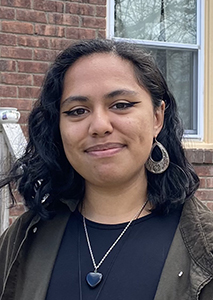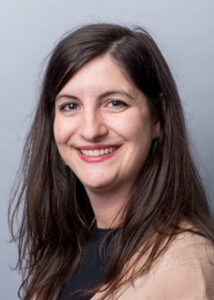Student Examines Meatpacking Labor Exploitation During Pandemic
Angelina Montez ‘22, a junior double majoring in communication and women’s, gender, and sexuality studies, received a spring Academic Year Undergraduate Research Experience (AYURE) award for her research project, “Understanding the Communicative Conditions of Meatpacking Labor Exploitation amid the COVID-19 Pandemic,” which she’s conducting with faculty mentor Kathleen P. Hunt, an assistant professor of communication.
The research project contrasts the internal working conditions of meatpacking employees with their companies’ public-facing media and public relations campaigns. Their research has found that companies misrepresent general worker safety as well as COVID-19-specific safety measures in an attempt to rewrite the narrative that is playing out in factories across the country. By emphasizing employees’ essential worker status and their dedication to supporting their employees during this crisis, companies project a public image as proud protectors rather than profiteers.


Despite the ubiquity of questionable working conditions throughout meat processing plants pre-pandemic, Montez and Hunt’s research has revealed that pre-pandemic ads and communications rarely, if ever, focused on issues of safety or employee protections. Conversely, their research has found that post-pandemic ads have been almost entirely focused on creating a facade of safety with emphasis on concern for the worker, the working conditions and the safety of the product produced. Montez and Hunt argue that companies are now engaging in the act known as “disastertising,” the practice of running ads that promote a company’s wholesome altruism in an attempt to manufacture a feeling of solidarity between the company and the community during a natural disaster or pandemic. The researchers assert that actual working conditions for most of these workers remains essentially unchanged, with the few exceptions being an increased distribution of COVID-specific personal protective equipment, as efforts have largely been focused on public perception rather than substantive changes.
Additional areas of focus within the project include employee shift lengths and overtime, legally mandated break periods, employee pay and benefits and general working conditions.
Montez is engaged with the subject matter and has found the research process both challenging and rewarding.
“Research is messy.” Montez said. “Eventually though, things start making sense and you start finding patterns and piecing things together. Things start to become a little more linear and a little more put together and you start to see ideas and concepts take shape. At a certain point it does make sense, and it is something that I can articulate – it’s not just thoughts in my head anymore.”
Montez meets with her mentor weekly, and Hunt reviews her research, identifies supplemental readings and provides feedback and support. The research process has allowed Montez to immerse herself in literature on the meatpacking industry, COVID protocols and the food system’s connection to the communication discipline.
Montez speaks highly of her mentor and co-collaborator and values the support as well as the empowerment that Hunt provides. “Professor Hunt invited me to participate in this research project and to co-author an academic paper on our area of research in order to give me more of a voice and a platform,” she said.
The team is focusing on presenting their findings at upcoming academic conferences with future plans to publish in an academic journal. Montez also hopes that COVID can be a catalyst for positive change regarding the working conditions of underrepresented groups. She will continue her work with food systems and environmental communication as well as issues of workers’ rights and environmental advocacy.
The Research, Scholarship, and Creative Activities (RSCA) office, with the support of the Office of Academic Affairs, offers annual AYURE grants to fund faculty-mentored student scholarship. These grants are open to all full-time faculty. The project should be designed to provide student learning and intellectual development beyond the classroom.
Faculty interested in applying for the AYURE award should visit the Research, Grants and Scholarship webpage towards the end of the Spring semester. The deadline for Fall 2021 proposals will be early in the Fall semester.
